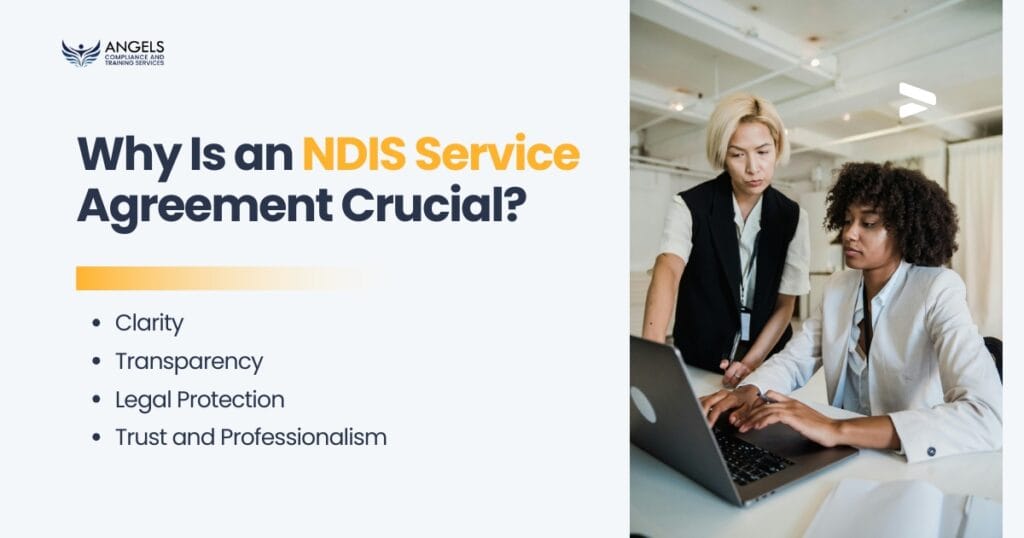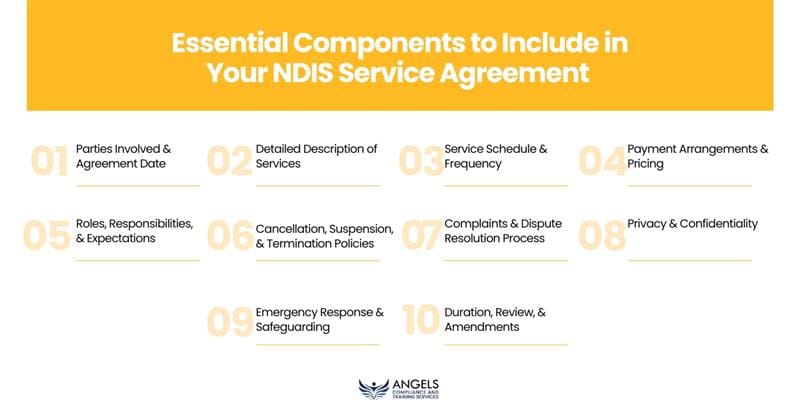Introduction
Imagine working with an NDIS provider without a clear agreement in place — it sounds risky, doesn’t it? This is why an NDIS Service Agreement is not just a piece of paperwork but a vital part of every NDIS provider’s operations.
What is an NDIS Service Agreement?
An NDIS Service Agreement is a formal, written contract between an NDIS participant (or their nominee) and a service provider. It outlines specific details about the services being delivered — including what services will be provided, how often, where, and at what cost.
It’s important to understand that an NDIS Service Agreement is different from an NDIS Plan. The NDIS Plan shows what funding a participant has, while the service agreement explains how that funding will be used for specific services.
Why Is an NDIS Service Agreement Crucial?

- Clarity – Sets clear expectations for both providers and participants.
- Transparency – Ensures everyone understands pricing, services, and policies.
- Legal Protection – Protects both parties if issues arise.
- Trust and Professionalism – Builds a strong, reliable relationship.
Essential Components to Include in Your NDIS Service Agreement

1. Parties Involved and Agreement Date
- Full legal names and contact details of both the participant (or their nominee/guardian) and the provider.
- The date the agreement is signed and becomes effective.
2. Detailed Description of Services
- Types of supports (e.g., personal care, therapy, community participation).
- Location and mode of service delivery (home, community, online).
- Clear alignment with the participant’s NDIS goals.
3. Service Schedule and Frequency
- Detailed information about when and how often services will occur.
- Processes for cancellations, rescheduling, and changes to services.
4. Payment Arrangements and Pricing
- Transparent cost breakdown (per hour, session, or package).
- Reference to the NDIS Pricing Arrangements and Support Catalogue.
- Payment methods:
- Self-managed
- Plan-managed
- NDIA-managed
- Invoicing schedule and payment terms.
- What happens if funding is exhausted or plans change.
5. Roles, Responsibilities, and Expectations
Participant’s Responsibilities:
- Provide accurate, up-to-date information.
- Notify the provider within agreed timeframes for cancellations or changes.
- Treat staff with respect.
- Provider’s Responsibilities:
- Deliver services as outlined.
- Ensure staff are qualified, trained, and compliant with NDIS requirements.
- Maintain participant privacy and confidentiality.
6. Cancellation, Suspension, and Termination Policies
- Agreed notice periods for cancellations.
- Fees for late cancellations (following NDIS pricing rules).
- Conditions under which the agreement may be suspended or terminated by either party.
7. Complaints and Dispute Resolution Process
- How to raise a complaint internally (contact person and steps).
- Escalation procedures for unresolved issues.
- External bodies like the NDIS Quality and Safeguards Commission for further resolution.
8. Privacy and Confidentiality
- How participant information is collected, used, stored, and protected.
- Compliance with the Privacy Act 1988 and the NDIS Code of Conduct.
9. Emergency Response and Safeguarding
- Emergency procedures during service delivery.
- Details of the provider’s safeguarding measures to ensure participant safety.
10. Duration, Review, and Amendments
- Duration of the agreement (e.g., fixed term or ongoing).
- How and when the agreement will be reviewed.
- Procedures for making amendments or adjustments.
Roles, Responsibilities, and Expectations
Setting clear roles and responsibilities within your NDIS Service Agreement ensures smooth collaboration between participants and providers.
1. Participant’s Responsibilities:
- Providing Necessary Information: Keep the provider updated with relevant details like medical information, emergency contacts, and any changes that may affect service delivery.
- Notifying About Cancellations: Inform the provider within the agreed notice period if you cannot attend a scheduled service.
- Respectful Conduct: Treat all provider staff with courtesy, respect, and fairness.
- Safe Environment: Ensure the environment for service delivery (especially in-home) is safe for staff.
- Following Agreed Processes: Adhere to agreed procedures regarding payments, cancellations, and participation in services.
2. Provider’s Responsibilities:
- Service Delivery: Deliver services exactly as outlined in the agreement.
- Professional Standards: Maintain required qualifications, certifications, and high-quality standards.
- Staff Compliance: Ensure staff are fully trained, experienced, and have completed all necessary checks, including police checks and Working With Children Checks (WWCC) if applicable.
- Confidentiality: Handle participants’ personal information securely and in line with privacy laws.
- Duty of Care: Provide services safely, ethically, and in alignment with participant needs.
- Transparency: Communicate openly regarding services, pricing, schedule changes, and any issues that arise.
Cancellation, Suspension, and Termination Policies
Clear cancellation, suspension, and termination policies protect both the participant and the provider from misunderstandings and unexpected charges.
1. Notice Periods for Cancellations:
- Participants and providers must provide a minimum notice period (typically 7 days, as outlined in the NDIS Pricing Arrangements) for cancelling scheduled services.
- If a participant cancels with sufficient notice, no fee is charged.
- Late cancellations (less than the notice period) may incur a cancellation fee of up to 100% of the service cost, in line with NDIS guidelines.
2. Fees for Late Cancellations:
- If the participant fails to attend a scheduled service or cancels late, the provider is entitled to charge a cancellation fee as per the current NDIS Price Guide.
3. Grounds for Suspension or Termination:
- By the Participant:
- If the participant is dissatisfied with the service, relocating, or switching providers.
- With appropriate notice as per the agreement.
- By the Provider:
- Non-payment of fees.
- Breach of agreement terms.
- Unsafe environments for service delivery.
- Aggressive, abusive, or unsafe behaviour from participants or their representatives.
- Immediate Termination:
- In extreme circumstances like risk to safety, illegal activities, or repeated breaches of the agreement.
- Process:
- Either party must notify the other in writing, specifying the reasons and the intended date for suspension or termination.
Privacy and Confidentiality
Protecting sensitive information is a core responsibility under the service agreement.
1. Collection, Storage, and Use of Information:
- Personal and sensitive information (such as health records, contact details, or financial data) will be collected only when necessary.
- Information is stored securely in line with strict data protection policies.
- Data is used only for purposes related to service delivery, compliance, and legal obligations.
2. Adherence to Privacy Laws:
- Compliance with the Privacy Act 1988 (Cth) and the NDIS Code of Conduct.
- Information will never be shared with third parties without written consent, unless required by law or necessary to protect safety.
Emergency Response and Safeguarding
Safety and wellbeing are critical components of service delivery.
1. Emergency Procedures:
- Clear procedures are outlined for emergencies occurring during service delivery, including contacting emergency services, first aid, and informing nominated contacts.
2. Safeguarding Policies:
- Providers have robust safeguarding policies in place to protect participants from harm, abuse, neglect, and exploitation.
- Staff are trained in risk management, incident reporting, and safety protocols.
Duration, Review, and Amendments
1. Duration of the Agreement:
- The agreement specifies whether it is:
- Fixed term (e.g., 6 or 12 months)
- Ongoing until a specific event (e.g., plan review, service completion)
- Open-ended with periodic reviews.
2. Review Process:
- The agreement is typically reviewed:
- Annually.
- Whenever the participant’s NDIS plan changes.
- Upon request by either party if needs change.
3. Amendments and Variations:
- Any changes to the agreement must be:
- Discussed and agreed upon by both parties.
- Documented in writing.
- Signed to confirm mutual acceptance.
Complaints and Dispute Resolution Process
Open and transparent handling of complaints is an essential part of a professional and compliant NDIS Service Agreement.
1. Internal Complaints Process:
- Participants can raise complaints directly with the provider.
- The agreement should specify:
- Who to contact (e.g., a complaints officer or manager at Angels Compliance and Training Services).
- How to make a complaint (e.g., email, phone call, or written form).
- Expected timeframes for acknowledgement and resolution.
2. Steps for Resolution:
- The provider will:
- Listen to the concern respectfully.
- Investigate the issue fairly and thoroughly.
- Provide a written response outlining outcomes and actions taken.
- If the participant is satisfied, the issue is considered resolved.
3. Escalation Process:
- If a satisfactory resolution cannot be achieved internally:
- Participants can escalate the matter to external bodies such as the NDIS Quality and Safeguards Commission, which oversees complaints related to safety, rights, and service quality.
- Contact details and guidance for contacting the Commission must be provided in the agreement.
4. Commitment to Fairness:
- Angels Compliance and Training Services commits to handling all complaints:
- Promptly
- Confidentially
- Without negative consequences for the participant
Legal and Compliance Frameworks
1. Adherence to the NDIS Act and Rules
All NDIS Service Agreements must comply with the NDIS Act 2013, ensuring both participant rights and provider responsibilities are protected.
2. NDIS Pricing Arrangements and Price Limits
All fees must comply with the NDIS Pricing Arrangements, safeguarding participants from being overcharged.
3. NDIS Quality and Safeguards Commission
- Providers must follow the NDIS Code of Conduct and meet all quality indicators.
- The Commission oversees participant safety and service quality.
4. Australian Consumer Law
- Participants are also protected by Australian Consumer Law, which guarantees:
- Fair service
- Clear information
- Protection from misleading conduct
Before You Sign: Key Considerations for Participants
- Know Your NDIS Plan: Make sure services support your goals.
- Read Carefully: Understand every clause before signing.
- Ask Questions: Clarify anything that’s unclear.
- No Pressure: Take your time to review.
- Seek Advice: Get help from an advocate, plan manager, or family member.
- Spot Red Flags: Be wary of vague language or rushed agreements.
Common Mistakes to Avoid
- Assuming Everything is Covered: Clarify every detail.
- Not Reading Cancellation Policies: Leads to surprise fees.
- Ignoring Dispute Resolution Processes: Know how to handle issues.
- Signing an Incomplete Document: Never sign unless the agreement is complete.
- Not Keeping a Copy: Always save a signed copy for your records.
Conclusion
A detailed, transparent, and well-drafted NDIS Service Agreement is the foundation of a successful, stress-free relationship between NDIS providers and participants. It protects both parties, ensures clarity, and fosters trust.
At Angels Compliance and Training Services, we assist NDIS providers in navigating the complexities of registration, renewal, audits, and compliance. A robust Service Agreement isn’t just paperwork — it’s a vital tool for maintaining quality, compliance, and participant satisfaction in the NDIS space.
